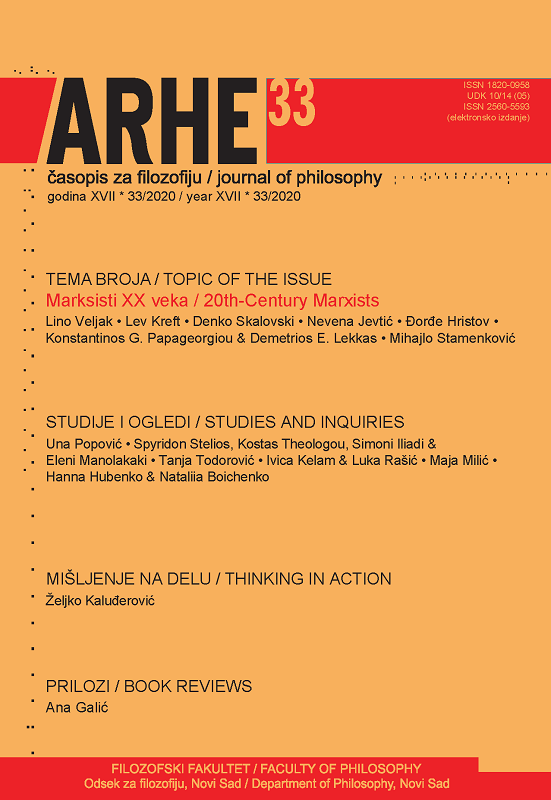ARGUMENT, SAZNANJE I ETIKA: RAZUMEVANJE KLJUČNIH POJMOVA U FILOZOFIJI EMPIRIJSKOM STUDIJOM O STUDENTIMA GRČKIH UNIVERZITETA
Glavni sadržaj članka
Apstrakt
Empirijska studija sprovedena je tako što se merio stepen do kojeg je shvatanje ključnih filozofskih pojmova (kakvi jesu „argument“,„saznanje“ i „etika“) oblikovano građom koja se predaje u učionici. Mera u kojoj se prešlo s prednastavnih koncepcija na udžbeničke formulacije istraživana je korišćenjem novog upitnika. Zaključci upućuju na to da studenti, načelno, zadržavaju svoja predteorijska shvatanja tih termina. U ovom okviru, neke formalne definicije bliže su zdravom razumu (npr. „etika“), dok neke druge no to nisu (npr. „saznanje“). Dalje, vrednovana je uloga intuicije u tom procesu, što vodi do tvrdnje da prethodni filozofski susreti izgleda da igraju presudnu ulogu u određivanju stvarnog shvatanja.
Detalji članka
Reference
Baggini, J., & Fosl, P. S. (2010). The philosopher’s toolkit: A compendium of philosophical concepts and methods (2nd edition). UK: Wiley-Blackwell.
Booth, J. (2006). On the mastery of philosophical concepts: Socratic discourse and the unexpected ‘effect’. In J. H. F. Meyer and R. Land (Eds), Overcoming barriers to student understanding: Threshold concepts and troublesome knowledge, 173-181, Oxfordshire: Routledge.
Cato, D. (1987). Getting clearer about 'getting clearer': R. S. Peters and second-order conceptual analysis. Journal of Philosophy of Education, 21, 25–36, https://doi.org/10.1111/j.1467-9752.1987.tb00140.x.
Churchill, L. R. (1999). Are we professionals? A critical look at the social role of Bioethicists. Daedalus, 128, 253–274.
DiSessa, A. A. (1988). Knowledge in pieces. In G. Forman & P. Pufall (Eds.), Constructivism in the computer age, 49-70, Hillsdale, NJ: Erlbaum.
Duke, E. A., Hicken, W. F., Nicholl, W. S. M., Robinson, D. B., & Strachan, J. C. G. (Eds.) (1995). Platonis opera tomus I. Oxford: Oxford University Press.
Goldman, A. I. (2007). Philosophical intuitions: Their target, their source, and their epistemic status. Grazer Philosophische Studien, 74, 1-26, https://doi.org/10.1163/9789401204651_002.
Herzog, A. R., & Bachman, J. G. (1981). Effects of questionnaire length on response quality. Public Opinion Quarterly, 45, 549-559.
Iliadi, S., Theologou, K. & Stelios, S. (2019). Are University Students Who Are Taking Philosophy Courses Familiar with the Basic Tools for Argument? Teaching Philosophy, 42, 3, 197-220. https://doi.org/10.5840/teachphil2019726106
Jackson, F. (1998). From Metaphysics to Ethics: A defence of conceptual analysis. Oxford: Clarendon Press.
Koutoungos, A. (2008). Between the moral and the rational. Athens: Papazissis Publishers.
Laverty, M. (2009). Learning our concepts. Journal of Philosophy of Education, 43, 27–41, https://doi.org/10.1111/j.1467-9752.2010.00753.x.
Lewis, D. (1983). Philosophical papers: Volume I. New York: Oxford University Press.
Locke, J. (1694/1975). Of identity and diversity (Chapter XXVII of An essay concerning human understanding). In J. Perry (Ed.), Personal identity, 33-52. Berkeley: University of California Press.
Meyer, J. H. F. & Land, R. (2003a). Threshold concepts and troublesome knowledge: linkages to ways of thinking and practising within the disciplines. In C. Rust (Ed.), Improving student learning: Improving student learning theory and practice – Ten years on. Oxford: OCSLD.
Murphy, P. K. & Alexander, P. (2008). The role of knowledge, beliefs, and interest in the conceptual change process: A synthesis and meta-analysis of the research. In S. Vosniadou (Ed.), International handbook of research on conceptual change, 583-616. New York: Routledge.
Prinz, J., J. (2007). Empirical philosophy and experimental philosophy. In J. Knobe, & S. Nichols (Eds.), Experimental Philosophy, 189-208. New York: Oxford University Press.
Pust, J. (2019). Intuition. In E. N. Zalta (Ed.), The Stanford Encyclopedia of Philosophy (URL:
Rusanen, Α.Μ., Lappi, O., Honkela, T., & Nederström, M. (2008). Conceptual coherence in philosophy education-Visualizing initial conceptions of philosophy students with self-organizing maps. In B. C. Love, K. McRae, & V. M. Sloutsky (Eds.), Proceedings of the 30th annual conference of the cognitive science society, 64-70. Austin, TX: Cognitive Science Society.
Salkind, N. (Ed.). (2007). Encyclopedia of measurement and statistics. Thousand Oaks, CA: SAGE Publications.
Salzberger, R. P. (1997). Ethics outside the limits of Philosophy: Ethical inquiry at Metropolitan State University. Teaching Philosophy 20(2), 169-191, https://doi.org/10.5840/teachphil199720220.
Sheppard, C. and Gilbert, J. (1991). Course design, teaching method and student epistemology. Higher Education, 22, 229-249, https://doi.org/10.1007/ bf00132289.
Vosniadou, S., & Brewer, W. F. (1992). Mental models of the Earth: A study of conceptual change in childhood. Cognitive Psychology, 24, 535-585, https://doi.org/10.1016/0010-0285(92)90018-w.
Weinberg, J. M., Nichols, S., & Stich, S. (2001). Normativity and epistemic intuitions. Philosophical Topics, 2, 429-460, https://doi.org/10.5840/ philtopics2001291/217.
Wortham, S. (2015). Clearing away assumptions through philosophy and research. Studies in Philosophy and Education, 34, 125–136, https://doi.org/10.1007/s11217-014-9419-2.
